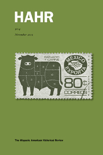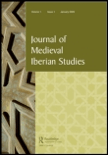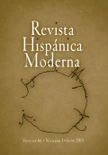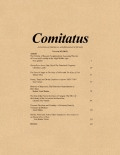
E-Spania-Revue Electronique d etudes Hispaniques Medievales
Scope & Guideline
Unlocking the Secrets of Medieval Spain for a Global Audience
Introduction
Aims and Scopes
- Interdisciplinary Historical Studies:
The journal emphasizes the intersection of history, literature, and cultural studies, focusing on the ways historical narratives shape and are shaped by literary texts. - Cultural Representations and Identity:
Exploring how cultural identities are constructed and represented in Hispanic literature and history, particularly regarding themes of gender, ethnicity, and social stratification. - Violence and Power Dynamics:
A significant focus on the representations of violence, authority, and social conflict in historical contexts, particularly how these themes manifest in literature and art. - Translation and Linguistic Studies:
The journal also examines the role of translation in the dissemination of knowledge and cultural exchange during the medieval and early modern periods. - Gender Studies and Feminist Perspectives:
A core area of research includes the exploration of women's roles and representations in historical narratives and literature, particularly regarding power dynamics.
Trending and Emerging
- Spaces of Confinement and Exchange:
There is a growing trend in examining spaces of confinement, such as prisons and convents, as sites of cultural exchange and social dynamics, reflecting contemporary concerns about power and isolation. - Animal Studies and Violence:
An emerging interest in animal studies, particularly regarding the representation of animal violence in historical contexts, indicates a broader engagement with ecological and ethical inquiries. - Cultural Hybridity and Cross-Cultural Exchanges:
Recent papers explore the complexities of cultural hybridity, particularly in the context of colonialism and migration, highlighting the interconnectedness of Hispanic and non-Hispanic cultures. - Feminist and Gender Studies:
An increase in research focusing on gender and feminist perspectives showcases a commitment to exploring women's roles and representations in history and literature. - Narrative and Memory Studies:
There is a rising focus on narrative techniques and the politics of memory in historical texts, indicating a shift towards understanding how stories shape collective identities.
Declining or Waning
- Classical Studies and Antiquity:
There seems to be a waning interest in classical antiquity and its direct influences on Hispanic literature, with fewer papers addressing this theme compared to previous years. - Religious and Theological Discourse:
Research on theological themes and religious discourse, particularly in relation to the Inquisition or conversion narratives, has decreased in frequency, suggesting a shift towards more secular or broadly cultural analyses. - Traditional Historiographical Approaches:
The journal is moving away from traditional historiography, which focused primarily on political narratives and royal genealogies, towards more nuanced social and cultural explorations.
Similar Journals

Reti Medievali Rivista
Illuminating the Past: Your Gateway to Medieval StudiesReti Medievali Rivista, published by FIRENZE UNIV PRESS, stands as a distinguished platform in the field of history, specifically focusing on the medieval period. With an ISSN of 1593-2214, this journal has embraced Open Access since 2000, ensuring that its scholarly content is readily available to researchers, students, and professionals worldwide. Based in Italy, the journal boasts a Q2 ranking in the Category of History according to the 2023 quartiles, reflecting its significant impact and contribution to the discipline. With a Scopus rank of #809 out of 1760 in the Arts and Humanities category, it sits comfortably within the 53rd percentile, affirming its quality and relevance in the academic community. The journal's scope encompasses a wide range of topics related to medieval studies, making it an invaluable resource for those seeking in-depth research and analysis in this pivotal era of history. Scholars are encouraged to explore its diverse articles and insights, further enriching the dialogue surrounding medieval scholarship.

Camino Real-Estudios de las Hispanidades Norteamericanas
Illuminating the Intersections of History and Culture in Hispanic CommunitiesCamino Real-Estudios de las Hispanidades Norteamericanas is an esteemed journal published by the Universidad de Alcalá, Instituto Franklin de Investigación Norteamericanos, focusing on the interdisciplinary study of North American Hispanic studies. With a dedicated mission to advance scholarship in this emerging field, the journal serves as a crucial platform for researchers, academics, and students interested in exploring the cultural, historical, and social dynamics of Hispanic populations in North America. While the journal does not currently operate under an Open Access model, it is committed to rigorous peer review and upholding academic standards that are essential for quality research dissemination. Situated in Alcalá de Henares, Spain, this journal not only contributes to the understanding of Hispanic influences in North American contexts but also strengthens the dialogue between diverse scholarly communities, making it a valuable resource for anyone engaged in this vital area of study.

HAHR-Hispanic American Historical Review
Fostering Insightful Dialogues on Hispanic American ExperiencesHAHR-Hispanic American Historical Review, published by DUKE UNIVERSITY PRESS, is a prestigious scholarly journal dedicated to the field of Latin American and Hispanic studies. With its ISSN 0018-2168 and E-ISSN 1527-1900, this journal boasts a remarkable reputation, as evidenced by its Q1 ranking in both Cultural Studies and History for 2023, placing it among the top tier of its category. The journal has consistently contributed to academic discourse since its inception in 1962, with a notable convergence of historical scholarship focused on the Hispanic American experience through 2024. HAHR is not open access, ensuring its publication standards resonate within a scholarly context that emphasizes rigorous peer review and academic integrity. Housed in the vibrant academic community of Durham, NC, this journal serves as an essential resource for researchers, professionals, and students alike, providing critical insights and fostering a deeper understanding of Hispanic heritage and history.

STUDI MEDIEVALI
Advancing Knowledge in Medieval StudiesSTUDI MEDIEVALI, published by the Centro Ital Stud Sull Alto Med, is a premier journal dedicated to the exploration of medieval studies, focusing on both cultural and historical dimensions. Since its inception in 2002, this journal has become an essential resource for scholars and students alike, providing critical insights into the complexities of the medieval era. Although it currently operates under a traditional access model, its contributions to the field are undeniable, with a 2023 ranking in the fourth quartile for Cultural Studies and History categories in Scopus rankings, highlighting its niche yet valuable position within academic discourse. Based in Spoleto, Italy, the journal serves as a platform for innovative research and interdisciplinary dialogue, inviting contributions that challenge conventional understandings and stimulate further inquiry into medieval life. Researchers and professionals will find in STUDI MEDIEVALI an opportunity to engage with a community of passionate scholars dedicated to uncovering the multifaceted realities of the medieval period.

Journal of Medieval Iberian Studies
Exploring the Rich Tapestry of Medieval IberiaThe Journal of Medieval Iberian Studies is a leading academic journal published by Routledge Journals, Taylor & Francis Ltd, dedicated to exploring the diverse and rich tapestry of medieval Iberian history and culture. With its ISSN 1754-6559 and E-ISSN 1754-6567, this journal serves as a vital resource for scholars engaged in the fields of cultural studies and history, attaining a prestigious Q1 ranking in both categories as of 2023. The journal is recognized for its significant contribution to the humanities, featuring peer-reviewed articles that foster innovative research and critical discourse on medieval Iberia from 2010 to 2024. Spanning an array of topics, it encapsulates interdisciplinary approaches to medieval studies, making it an essential publication for researchers, professionals, and students alike who seek to deepen their understanding of this pivotal period in history. Although it currently does not offer open access options, the journal is committed to advancing scholarly discussion and knowledge dissemination within the academic community.

Revista Hispanica Moderna
Exploring the Depths of Hispanic HeritageRevista Hispanica Moderna, published by University of Pennsylvania Press, is a scholarly journal dedicated to exploring the rich tapestry of Hispanic cultural, historical, and literary studies. With an ISSN of 0034-9593 and an E-ISSN of 1944-6446, this esteemed publication operates within the United States, ensuring a broad international reach. While it currently does not offer Open Access, the journal provides significant insights across diverse fields, categorized as Q4 in Cultural Studies, History, and Literature and Literary Theory as per the 2023 standards. Although the journal ranks in the lower quartiles of its fields, its systematic approach to modern Hispanic studies offers valuable opportunities for gaining perspectives that are often underrepresented. Researchers, professionals, and students are encouraged to engage with its content as it navigates the complexities of cultural identities and historical narratives from 2019 to 2024 and beyond, making important contributions to the ongoing discourse in the humanities.

Revista Chilena de Estudios Medievales
Fostering Interdisciplinary Insights into Medieval StudiesRevista Chilena de Estudios Medievales, published by Universidad Gabriela Mistral, is a premier open access journal that has been serving the field of medieval studies since 2012. With its unique ISSN 0719-2215 and E-ISSN 0719-689X, this journal provides a vital platform for scholars, researchers, and students interested in the rich tapestry of medieval history, literature, and culture. Located in Santiago, Chile, at Ladislao Errazuriz 2073, Providencia, Santiago 00000, the journal aims to foster a deeper understanding of the medieval period through interdisciplinary research and insightful articles. While impact factors and HIndex data are currently unavailable, the journal is dedicated to maintaining high academic standards and promoting knowledge dissemination in the field. Its open access model ensures that research is freely available to the global community, thereby enhancing engagement and collaboration among medieval studies scholars. Join us in exploring the depths of the medieval world through Revista Chilena de Estudios Medievales.

CAMBRIAN MEDIEVAL CELTIC STUDIES
Exploring the Heart of Medieval Celtic HeritageCambrian Medieval Celtic Studies is a distinguished academic journal dedicated to the exploration and analysis of the rich cultural, historical, and linguistic heritage of the Celtic regions during the medieval period. Published by the Department of Welsh at the University of Aberystwyth in the United Kingdom, this journal serves as a vital platform for scholars and researchers in the fields of archaeology, history, linguistics, and literary studies. With its ISSN 1353-0089, the journal has been operational since 2002, delivering valuable insights and fostering scholarly discourse up to the present, with plans for future publications extending to 2024. Although currently categorized in the Q4 quartile across various relevant fields, Cambrian Medieval Celtic Studies remains committed to enhancing the understanding of medieval Celtic culture through rigorous research and peer-reviewed content. Researchers and students alike will find this journal an essential resource for advancing their studies in these dynamic fields, as it provides open access to a wealth of interdisciplinary perspectives in the arts and humanities.

COMITATUS-A JOURNAL OF MEDIEVAL AND RENAISSANCE STUDIES
Exploring the Rich Tapestry of Medieval and Renaissance ErasCOMITATUS: A Journal of Medieval and Renaissance Studies, published by the University of California Center for Medieval and Renaissance Studies, serves as a critical platform for exploring the complexities of medieval and Renaissance eras through diverse scholarly lenses. With an ISSN of 0069-6412 and a dedicated E-ISSN of 1557-0290, this journal operates primarily in the United States, delivering rigorous academic discourse aimed at historians, literary critics, and art scholars alike. Although currently classified in the Q4 category within its fields in 2023, including History, Literature and Literary Theory, and Visual Arts and Performing Arts, COMITATUS invites submissions that challenge prevailing narratives and introduce innovative perspectives on cultural phenomena. It has been publishing since 2002 with periods of convergence spanning from 2002 to 2009, and from 2017 to 2023. The journal's commitment to open dialogue and research dissemination makes it an essential resource for students, professionals, and researchers interested in medieval and Renaissance studies, fostering a deeper understanding of these pivotal historical periods.

Ogigia-Revista Electronica de Estudios Hispanicos
Navigating the Landscape of Linguistics and EducationOgigia-Revista Electronica de Estudios Hispanicos is a distinguished academic journal published by EDICIONES UNIV VALLADOLID in Spain, focusing on the rich field of Hispanic studies including literature, linguistics, and education. Since it became an Open Access journal in 2013, it has provided a platform for scholars and practitioners to disseminate their research widely, fostering critical engagement and dialogue within the global academic community. As of 2023, the journal holds various category quartiles, reflecting its impact in relevant disciplines—ranked in Q4 in Education, Q3 in Linguistics and Language, and Q2 in Literature and Literary Theory. In the Scopus metrics, it occupies the 54th percentile in Literature and Literary Theory, underscoring its significant contribution to the field. Its core objective is to explore themes pertinent to Hispanic culture and language, providing an essential resource for researchers, educators, and students engaged with the intricacies of Spanish studies.